
For the first time since Russia began its so-called ‘special military operation’ three months ago—and as the war rages on east of the Dnieper River—the National Opera of Ukraine in Kyiv, in a symbolic act of defiance, has reopened its doors to the public.
Performers of the Italian composer Gioachino Rossini’s comic opera, The Barber of Seville, on Saturday, May 21st, graced the eyes and ears of the lucky few hundred people who managed to scoop up tickets to the Opera House’s first production since the city’s cultural life came to a screeching halt in late February, Euronews reports.
Although the 120-year-old theatre, named after the Ukrainian artist, poet, writer, and political figure, Taras Shevchenko, has enough seats to host up to 1,300 attendees, only 300 seats in the stalls were filled in case the air-raid sirens sounded—and the audience had to evacuate to the basement coat check, which doubles as a bomb shelter and only has enough space for 300 people.
Opening of National opera of Ukraine. So happy to be here and see so many people, including ambassadors of foreign states, who came back to Kyiv. In wartime music is relief and light. pic.twitter.com/PO2UAcES1d
— Tkachenko Oleksandr (@otkachenkoua) May 21, 2022
The performance, which is said to have received a 10-minute standing ovation, took place even though many of the opera company’s members are still abroad—and while some in the orchestra are fighting in the Donbas or serving in the territorial defense forces. The theatre, to the delight of many, has managed to reopen its doors thanks to the return of some 70% of its staff.
The stalls’ seats were filled with Ukrainians from all walks of life, including members of President Volodymyr Zelensky’s cabinet, doctors, as well as military personnel who have temporarily returned from the front lines.
One audience member, a soldier who goes by the name Volodymyr, told the Guardian, “I can’t say opera is my usual entertainment, but it is an incredible feeling to hear this music and to be in a different world for a little while, before coming back to our reality.”
Kyiv’s Opera House is back up and running – great to see people laughing and smiling during the performance pic.twitter.com/R797ACPI5H
— Tom Soufi Burridge (@TSoufiBurridge) May 21, 2022
Lt. Maksym Butkevych, who vacated his barracks for the day to watch the performance, said that the reopening of the opera house was “a symbol that Kyiv, which was surrounded—and surrounded by killing fields—has reopened its cultural institutions.”
“It is a kind of promise that we will prevail. Life will go on, not death,” he said.
Another spectator, a trauma doctor who treats wounded soldiers, said: “I hope that peace will prevail so that everyone can attend shows like this without fear.”
Ukraine’s Minister of Culture Oleksandr Tkachenko, who was also present, told reporters: “We wanted to open with symbolic performances: first a European classic and then a Ukrainian classic.” He added that the theatre planned to remove all Russian repertoire and called on other opera houses abroad to do the same, saying: “In times of war, this is a symbolic step. We should celebrate French, Italian, and certainly Ukrainian composers instead.”
